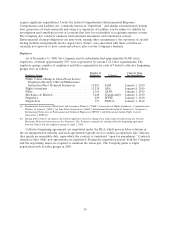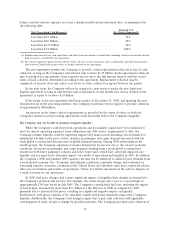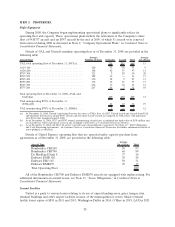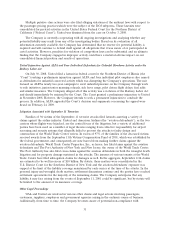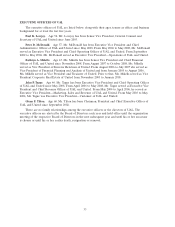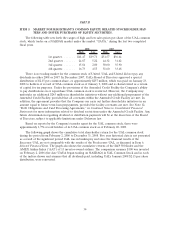United Airlines 2008 Annual Report Download - page 24
Download and view the complete annual report
Please find page 24 of the 2008 United Airlines annual report below. You can navigate through the pages in the report by either clicking on the pages listed below, or by using the keyword search tool below to find specific information within the annual report.Company’s U.S. labor agreements become amendable in January 2010, with negotiations between the
Company and the labor unions scheduled to commence during 2009. The Company can provide no
assurance that a successful or timely resolution of labor negotiations for all amendable agreements will
be achieved. There is also a risk that dissatisfied employees, either with or without union involvement,
could engage in illegal slow-downs, work stoppages, partial work stoppages, sick-outs or other actions
short of a full strike that could individually or collectively harm the operation of the airline and
materially impair its financial performance.
Increases in insurance costs or reductions in insurance coverage may adversely impact the Company’s
operations and financial results.
The terrorist attacks of September 11, 2001 led to a significant increase in insurance premiums and
a decrease in the insurance coverage available to commercial airlines. Accordingly, the Company’s
insurance costs increased significantly and its ability to continue to obtain certain types of insurance
remains uncertain. The Company has obtained third-party war risk (terrorism) insurance through a
special program administered by the FAA, resulting in lower premiums than if it had obtained this
insurance in the commercial insurance market. Should the government discontinue this coverage,
obtaining comparable coverage from commercial underwriters could result in substantially higher
premiums and more restrictive terms, if it is available at all. If the Company is unable to obtain adequate
war risk insurance, its business could be materially and adversely affected.
If any of United’s aircraft were to be involved in an accident, the Company could be exposed to
significant liability. The insurance it carries to cover damages arising from any future accidents may be
inadequate. If the Company’s insurance is not adequate, it may be forced to bear substantial losses from
an accident.
The Company relies heavily on automated systems to operate its business and any significant failure of these
systems could harm its business.
The Company depends on automated systems to operate its business, including its computerized
airline reservation systems, flight operations systems, telecommunication systems and commercial
websites, including united.com. United’s website and reservation systems must be able to accommodate a
high volume of traffic and deliver important flight and schedule information, as well as process critical
financial transactions. Substantial or repeated website, reservations systems or telecommunication
systems failures could reduce the attractiveness of United’s services versus its competitors and materially
impair its ability to market its services and operate its flights.
The Company’s business relies extensively on third-party providers. Failure of these parties to perform as
expected, or unexpected interruptions in the Company’s relationships with these providers or their provision of
services to the Company, could have an adverse effect on its financial condition and results of operations.
The Company has engaged a growing number of third-party service providers to perform a large
number of functions that are integral to its business, such as operation of United Express flights,
operation of customer service call centers, provision of information technology infrastructure and
services, provision of aircraft maintenance and repairs, provision of various utilities and performance of
aircraft fueling operations, among other vital functions and services. The Company does not directly
control these third-party providers, although it does enter into agreements with many of them that
define expected service performance. Any of these third-party providers, however, may materially fail to
meet their service performance commitments to the Company. The failure of these providers to
adequately perform their service obligations, or other unexpected interruptions of services, may reduce
the Company’s revenues and increase its expenses or prevent United from operating its flights and
providing other services to its customers. In addition, the Company’s business and financial performance
could be materially harmed if its customers believe that its services are unreliable or unsatisfactory.
24


